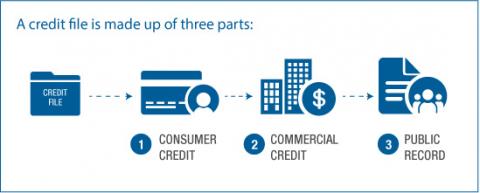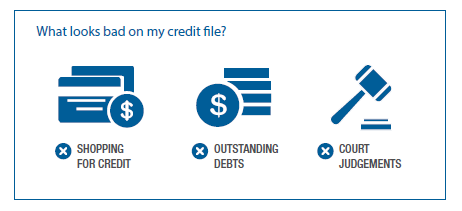Credit File
Your file includes both personal identification information, as well as credit-related information. This may include consumer credit details, business or commercial credit details, and public-record information. Check out What’s in my credit file? for more details.
What’s in my credit file?
What can be in the consumer-credit section of a credit file?
Loan enquiries made in the past five years for household, personal or family purposes or to purchase, re-finance or renovate a residential investment property, or where you have gone guarantor for someone else with respect to consumer credit
Details of any debts including serious credit infringements and debts that are overdue by 60 days or more
Read More
How often is a credit file updated?
Under the new comprehensive credit reporting system your consumer credit report can be updated on a monthly basis with account repayment information such as if you have paid a credit card, or other personal credit, on time. If it has not been paid on time this will also be recorded. Your credit report may also be updated whenever you apply for credit, open or close an account, change your credit limit or agree to act as a guarantor for someone else. Credit providers may also update your report when they list any overdue debts you may have incurred and we may also add certain information obtained from third parties, such as default judgments, court writs and Bankruptcy Act information.
How long does information stay on my credit file?
This all depends on the type of data. Identity information including your name, date of birth, gender, driver’s licence and address history is held for the life of the credit report. For other information on your credit report, here are some of the typical timeframes.
Two years
Five years
Who can access my credit file?
Access to your credit file is governed the Privacy Act 1988 (the Act). This legislation prescribes to whom, and for what purpose, a credit reporting agency can disclose information held in your consumer credit file. The Australian Privacy Principles of the Act governs other types of personal information held by organisations, including Veda.
In certain circumstances, Veda can disclose information in your credit information file (consumer credit) to various organisations, such as:
Why is my credit file important when I’m applying for credit?
If you’re looking to apply for a loan or other types of credit, these tips may help your application.
- Check your credit file to help ensure the information is correct. This may give you a better idea of what the lender will see when considering your application for credit. This is particularly important if one lender has already declined your application wholly or partly because of information on your credit file. In this case, consider checking your file before making any further applications for credit.
- You may like to apply for credit with your existing bank or credit union. They have your banking history at their fingertips and can easily access your personal details and spending habits by checking your records and statements.
- An overdue debt listed on your credit file may affect your ability to obtain credit because it indicates that you may be more likely to default on a payment in the next 12 months. Try to pay off all outstanding debts and aim to not default on any accounts moving forward.


